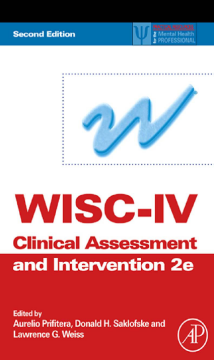
BOOK
WISC-IV Clinical Assessment and Intervention
Aurelio Prifitera | Donald H. Saklofske | Lawrence G. Weiss
(2008)
Additional Information
Book Details
Abstract
The Wechsler Intelligence Scale for Children: Fourth Edition (WISC-IV) is one of the most often used measures to assess intelligence and cognitive functions in children, ages 6-16 years. The second edition of the WISC-IV Clinical Assessment and Intervention will include new information obtained from the clinical use of the WISC-IV in practice. Information on the basic use of the assessment tool is condensed from three chapters into one, with four new chapters discussing how to use and interpret WISC-IV with additional clinical populations. These new populations include pervasive Developmental Disorders including autism, Social and emotional disorders, psychiatric disorders, and medical disorders that may affect intelligence. An additional new chapter discusses intervention planning across patient populations. Each of the chapters (revised original chapters and new chapters) will additionally include case studies including diagnosis and intervention.
Overall, the material in the book is 65% changed, new, and updated. These changes make the second edition better able to meet a clinician's needs in using and interpreting this test.
- Inclusion of case studies illustrating the clinical applications of the WISC-IV in assessment and program planning
- Intervention recommendations following from assessment to diagnosis
- Introductory chapter illustrating the relationships between the WISC-IV index scores and intervention planning
- New chapters on Learning Disabilities, emotionally disturbed children, systematic illness, and Autism Spectrum Disorders
- Specialized chapters on neuropsychological applications, executive functioning, and cultural issues
- Additional information to aid test interpretation including extended norms for gifted children and the Cognitive Proficiency Index
- All chapters revised to reflect data obtained from the test in clinical use
"This edited volume is intended as a resource for both graduate instructors and practitioners who use the Wechsler Intelligence Scale for Children-IV (WISC-IV) as a tool for clinical assessment, diagnosis, and the development of psychoeducational interventions for a variety of disability categories. With a clear scientist-practitioner perspective and a focus on data interpretation and integration, it is a welcome addition to any professional library, particularly for practitioners who frequently use the WISC-IV as an assessment tool... Taken as a whole, the content and organization of this book makes the information easily accessible and very relevant for clinicians who use the WISC-IV as one of their assessment tools." --Journal of Psychological Assessment, 2010
Praise for previous editions: "...the book is an excellent resource to assist practitioners to move beyond the mechanics of testing into the clinical enterprise of assessment. It would be a welcome addition to the bookshelf of practitioners at any stage of their career providing novices with direct instruction in both technique and theory and more experienced clinicians with excellent examples of what constitutes best practice." --Canadian Journal of School Psychology (2008, 23:140)
"It has wonderful information that is invaluable for having a solid knowledge base about this test. The editors and contributors are credible authorities. ...The book contains everything you want to know about the WISC-IV. ...This is a book that you must have if you are going to do testing with children. It is not just for the clinician but students who are in the process of learning. It has much useful information and interpretive strategies to guide one through a wealth of data obtained by the WISC-IV. The book addresses special populations and contains helpful cross-cultural information. I don't think there is any other book to compare with it on this topic." --DOODY REVIEW
"...those who are ready to take the next step in the understanding of the test's complexity and potential uses will expand their knowledge a great deal after reading the Prifitera et al. volume." --PsycCRITIQUES
